Unit 2 Section A(1a-2d) 课件+内嵌音视频(人教新目标九年级全册 Unit 2 I think that mooncakes are delicious!)
文档属性
| 名称 | Unit 2 Section A(1a-2d) 课件+内嵌音视频(人教新目标九年级全册 Unit 2 I think that mooncakes are delicious!) | 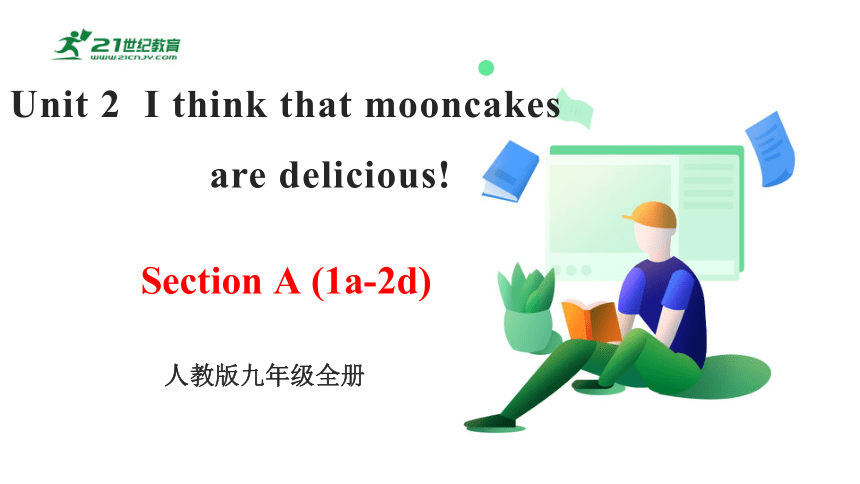 | |
| 格式 | pptx | ||
| 文件大小 | 122.7MB | ||
| 资源类型 | 试卷 | ||
| 版本资源 | 人教新目标(Go for it)版 | ||
| 科目 | 英语 | ||
| 更新时间 | 2023-07-22 16:10:44 | ||
图片预览

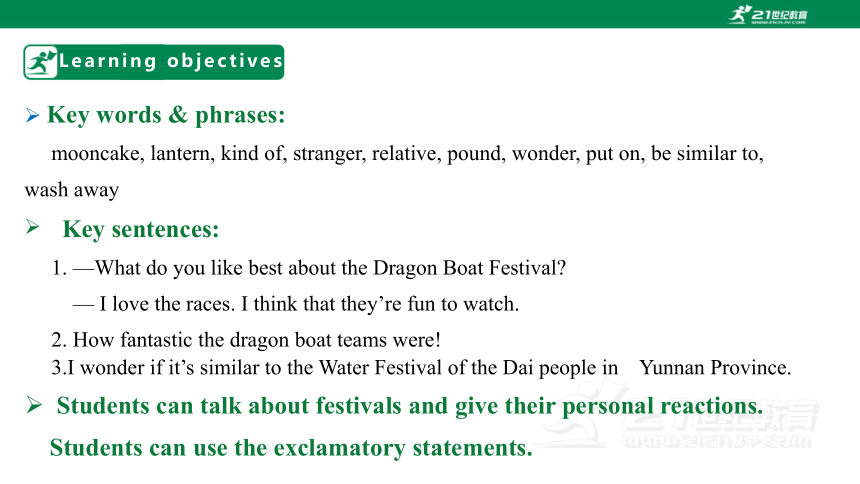
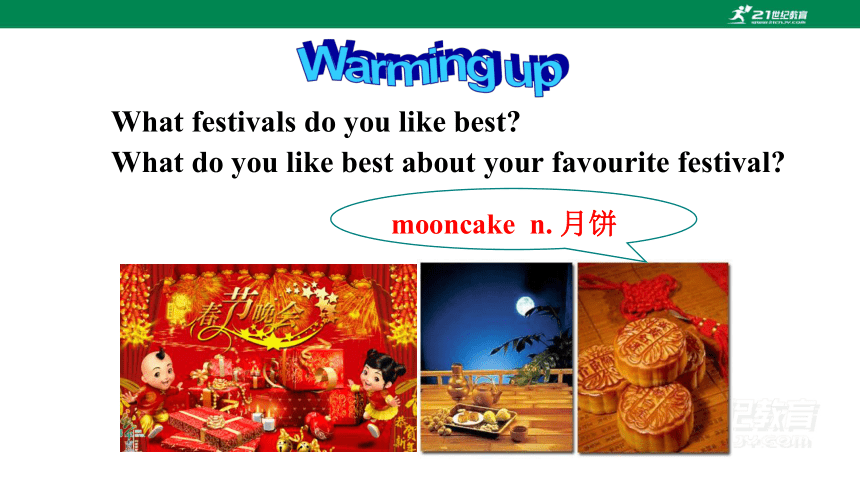
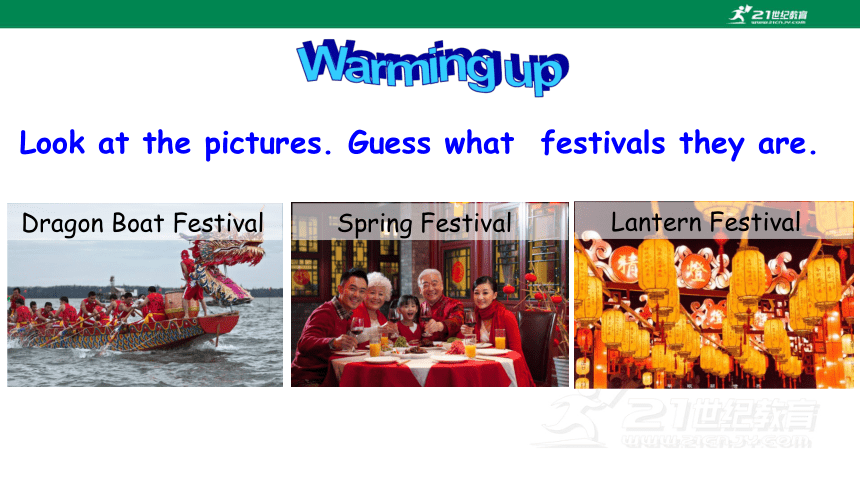

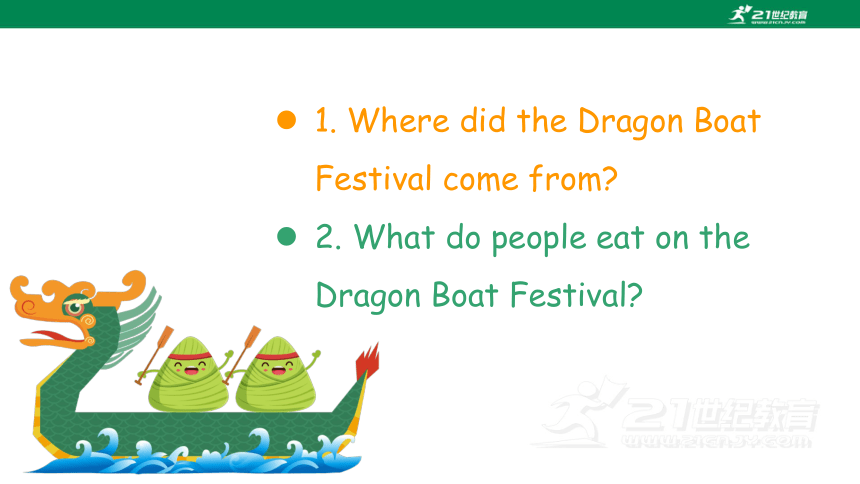
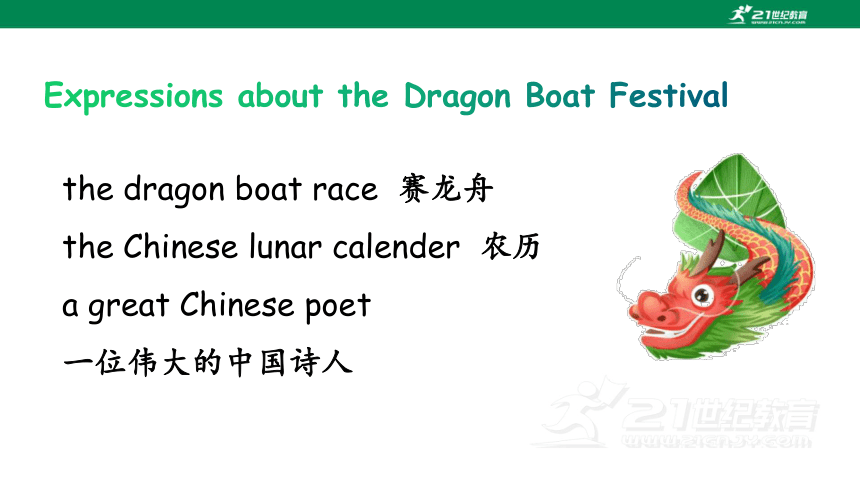
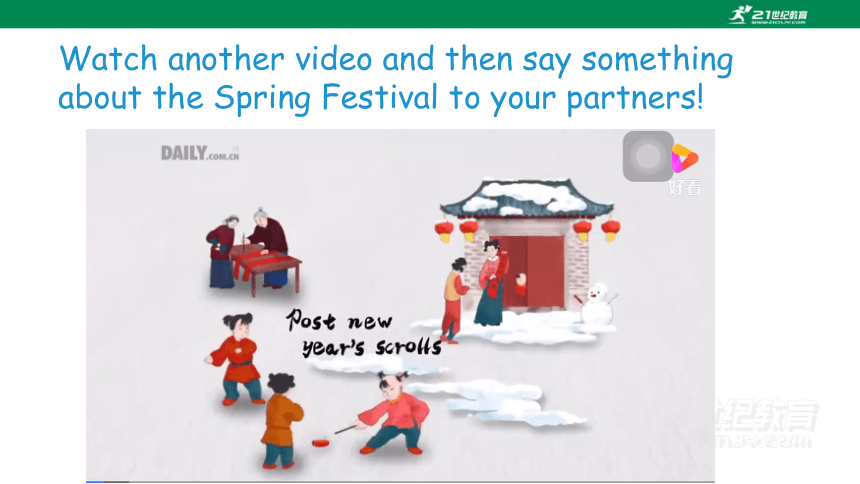
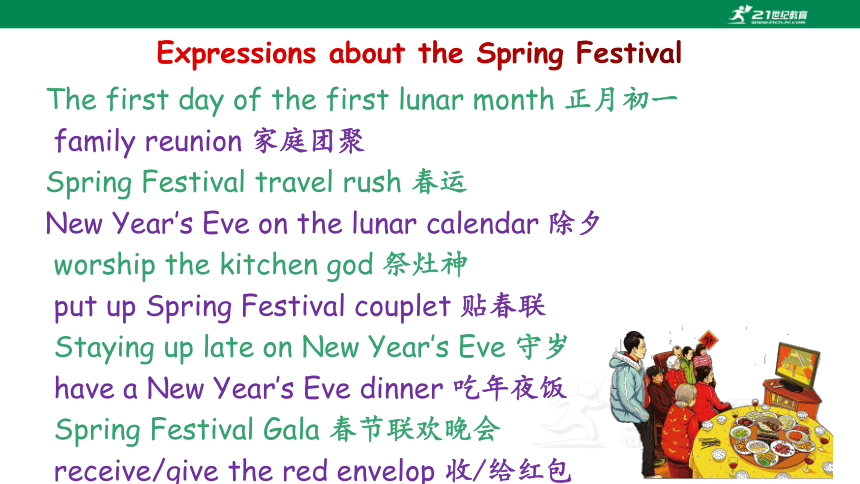
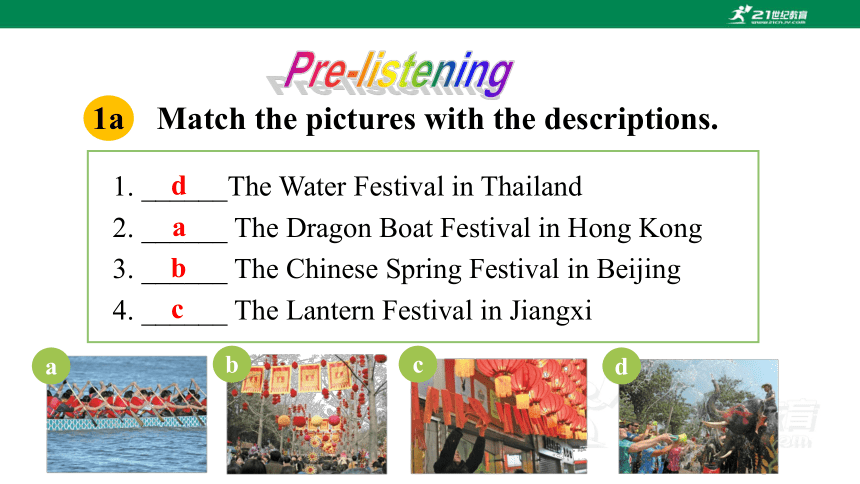
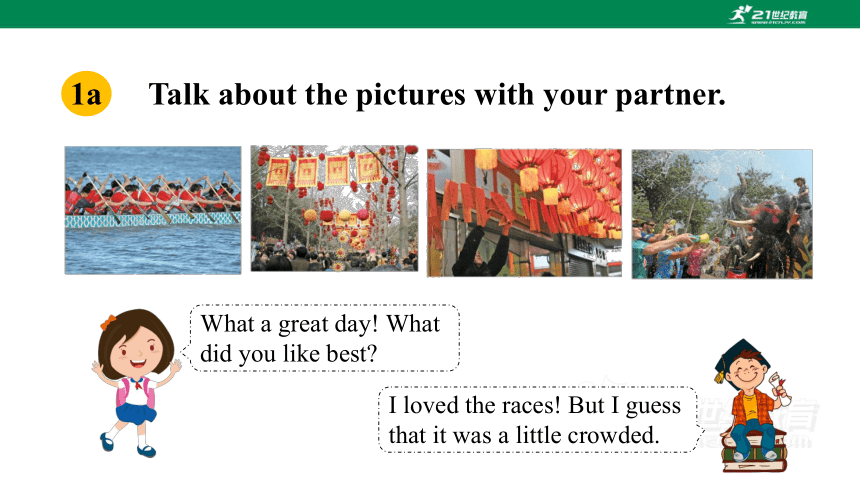
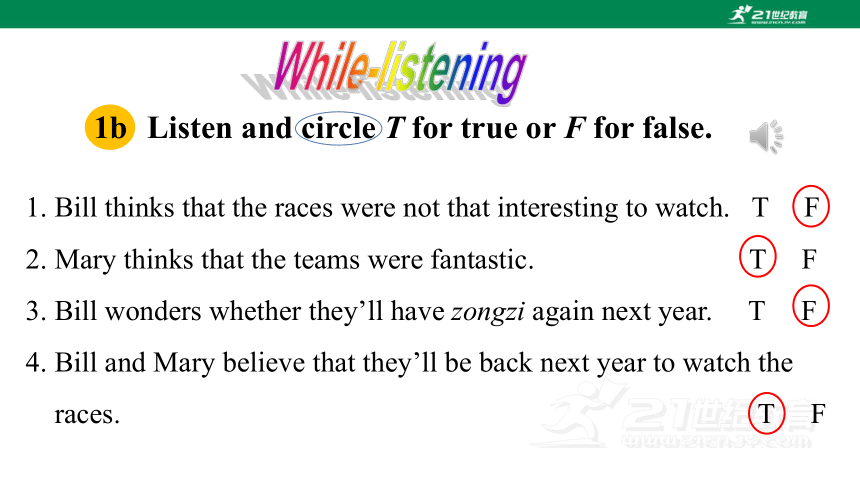
文档简介
(共47张PPT)
Unit 2 I think that mooncakes
are delicious!
Section A (1a-2d)
人教版九年级全册
Learning objectives
Key words & phrases:
mooncake, lantern, kind of, stranger, relative, pound, wonder, put on, be similar to,
wash away
Key sentences:
1. —What do you like best about the Dragon Boat Festival
— I love the races. I think that they’re fun to watch.
2. How fantastic the dragon boat teams were!
3.I wonder if it’s similar to the Water Festival of the Dai people in Yunnan Province.
Students can talk about festivals and give their personal reactions.
Students can use the exclamatory statements.
What festivals do you like best
What do you like best about your favourite festival
mooncake n. 月饼
Warming up
Warming up
Dragon Boat Festival
Spring Festival
Lantern Festival
Look at the pictures. Guess what festivals they are.
Egjoy a vodeo
1. Where did the Dragon Boat Festival come from
2. What do people eat on the Dragon Boat Festival
Expressions about the Dragon Boat Festival
the dragon boat race 赛龙舟
the Chinese lunar calender 农历
a great Chinese poet
一位伟大的中国诗人
Watch another video and then say something about the Spring Festival to your partners!
Expressions about the Spring Festival
The first day of the first lunar month 正月初一
family reunion 家庭团聚
Spring Festival travel rush 春运
New Year’s Eve on the lunar calendar 除夕
worship the kitchen god 祭灶神
put up Spring Festival couplet 贴春联
Staying up late on New Year’s Eve 守岁
have a New Year’s Eve dinner 吃年夜饭
Spring Festival Gala 春节联欢晚会
receive/give the red envelop 收/给红包
1a
Match the pictures with the descriptions.
1. ______The Water Festival in Thailand
2. ______ The Dragon Boat Festival in Hong Kong
3. ______ The Chinese Spring Festival in Beijing
4. ______ The Lantern Festival in Jiangxi
a
b
c
d
d
a
b
c
Pre-listening
What a great day! What did you like best
I loved the races! But I guess that it was a little crowded.
Talk about the pictures with your partner.
1a
1. Bill thinks that the races were not that interesting to watch. T F
2. Mary thinks that the teams were fantastic. T F
3. Bill wonders whether they’ll have zongzi again next year. T F
4. Bill and Mary believe that they’ll be back next year to watch the
races. T F
1b
Listen and circle T for true or F for false.
While-listening
Listen again and answer the questions.
What did Bill like best
A. The dragon boat teams.
B. The color of the boats.
C. The races.
What food did Bill and Mary both like
A. Zongzi. B. Mooncakes. C. Rice.
While-listening
1c
Talk about the festivals in 1a.
Post-listening
What do you like best about the Dragon Boat Festival
I love the races. I think that they’re fun to watch.
What do you like best about the Chinese Spring Festival
I love the food. I think that they are delicious.
Pair Work
What do you like best about the Water Festival
I don’t like Water Festival because I think that getting wet is terrible.
Pair Work
2a
Listen to the conversation between Wu Ming and Harry and circle the correct words in the sentences.
1. Wu Ming and Harry are cousins / strangers / friends.
2. Wu Ming went to Singapore / Hong Kong / Macao for his vacation.
3. Wu Ming visited his relatives / friends / classmates.
4. Wu Ming liked eating out / shopping / the Dragon Boat Festival
best.
While-listening
2b
Wu Ming did a lot of fun activities, but there were also downsides. Listen again and fill in the chart.
put on weight
spent money
hot weather
缺点
While-listening
What did you do on your vacation
I visited my cousins. I think that we ate five meals a day! I’ve put on five pounds!
I guess the food was delicious, right
增加(体重);发胖;
穿上;上演
磅(重量单位);英镑(英国货币单位)
2c
Role-play conversations between Wu Ming and Harry.
Use the information in 2a and 2b or make your own conversations.
Post-listening
You can think about it from the following aspects:
What was the best part of your vacation What were the
downsides
Tip: Try to use the sentence structure “I think / know / guess /
believe / wonder that …”.
Where did you go on your vacation What did you do
Post-listening
In 2d we can find a conversation between Clara and Ben. Clara is going to Chiang Mai.
1. Do you know where Chiang Mai is
It’s a city in Thailand.
2. Have you ever been to Thailand
3. What do you know about the weather there
And there is an important festival in Thailand.
4. Do you know anything about the Water Festival
Pre-reading
Clara: Guess what I’m going to Chiang
Mai in two weeks.
Ben: Wow, sounds like fun! But I believe that
April is the hottest month of the year there.
Clara: Yes, that’s true. But there’s a water
festival from April 13th to 15th.
Ben: I wonder if it’s similar to the Water
Festival of the Dai people in Yunnan Province.
Clara: Yes, I think so. This is the time of the Thai New Year. People go on the
streets to throw water at each other.
Ben: Cool! But why do they do that
Clara: Because the new year is a time for cleaning and washing away bad
things. Then you’ll have good luck in the new year.
in+时间段 ”……之后”
与……类似的
throw… at…把……抛向
wash away 冲掉;冲走
Role-play the conversation.
2d
Post-listening
Why are the Dai people mentioned in the dialogue
When is the Water Festival in Thailand And what do people always do
3. Why do people throw water at each other
Try to answer the questions.
The Water Festival is from April 13th to 15th. This is the time of the
Thai New Year. People go on the streets to throw water at each other.
Because the Water Festival is similar to that of the Dai people in Yunnan.
Because the new year is a time for cleaning and washing away bad
things. Then people will have good luck in the new year.
2d
Post-reading
Pair Work
Suppose you are going to visit another city (or country), your friend is going to ask you some information about it. Make up a conversation with your partner!
1. What a great day! (教材P9)
What a great day!是由what引导的感叹句。表示喜、怒、哀、乐等强烈情感时用感叹句。感叹句分两种:一种是以what引导,一种是以how引导。句尾用感叹号,读降调。
此处的句式结构为: What + a /an + 形容词 + 可数名词单数形式 (+主语 + 谓语)!, 口语中常可以省略主语和谓语。
e.g. What a beautiful city (it is)! (这是一个)多么美丽的城市啊!
Language Points
What引导的感叹句句式结构还可以是:
What + 形容词 + 可数名词复数或不可数名词(+主语 + 谓语)!
e.g. What nice weather it is!
多么好的天气啊!
【拓展】
How引导的感叹句的结构为:How + adj. / adv.(+ 主语 + 谓语) !
e.g. How hot it is today!
今天天气多么热啊!
How high the kite is flying!
那只风筝飞得多么高啊!
2. But I guess it was a little too crowded. (教材P9)
crowded adj. 拥挤的
e.g. The earth is becoming more and more crowded.
地球正变得越来越拥挤。
The train was very crowded, and we had to stand.
火车上很拥挤, 我们只能站着。
【拓展】
crowd n. 人群; 群众
e.g. A crowd of about 15,000 attended the concert.
大约有15000人出席了音乐会。
crowd v. 挤; 靠近; 盯着
e.g. Thousands of people crowded the narrow streets.
成千上万的人把狭窄的街道挤得水泄不通。
3. Bill thinks that the races were not that interesting to watch.
(教材P9)
本句中第一个that是宾语从句的引导词, 第二个that是副词, 意为“那么; 那样”, 表示程度, 修饰形容词或副词, 常用于否定句。
e.g. It is not that warm.
天气没有那么暖和。
that的用法
4. Bill wonders whether they’ll have zongzi again next year. (教材P9)
wonder在此处作动词, 意为“想知道”, 后面接由who / what / why / how引导的宾语从句或“特殊疑问词 + 动词不定式”, 意为“想知道......”。
e.g. I wonder how James is getting on. 我想知道James怎么样了。
What are they going to do now, I wonder
我想知道他们现在打算做什么?
wonder后面还可以接if / whether引导的宾语从句, 表示“想知道是否......”, 表示一种委婉的请求或疑问。
e.g. I wonder whether you could pass me the butter
你能不能把黄油递给我
I wonder if you could give me some information about places
to visit in the area
不知你能否给我提供一些这个地区可供游玩的地方的情况。
【拓展】
wonder还可以作名词, 表示“惊讶; 惊叹”, “奇观; 奇迹”。
e.g. The sight of the Great Wall filled us with wonder.
长城的景象让我们惊叹万分。
We spent a week visiting the wonders of Ancient Chinese
civilization.
我们花了一周时间游览了中国古代的文明的奇观。
5.I've put on five pounds! 我胖了五磅!(教材p10)
(1)put on 此处意为“增加(体重);发胖”。
e.g.:She can eat what she wants but she never puts on weight.
【拓展】put on的其他含义:
①穿上;戴上
e.g.:My mother put on her coat and went out.
②上演;举办
e.g.:One summer our children put on a play.
6.I’m going to Chiang Mai in two weeks. (教材P10)
in two weeks用到了“in + 时间段”这个结构, 意为“......之后”, 该结构常与将来时连用, 也可用于回答how soon的提问。
e.g. I will return to my hometown in two weeks.
— How soon will he be back
— In an hour.
辨析:“in + 时间段”, “after + 时间段”与“for + 时间段”
e.g. Dinner will be ready in 10 minutes.
晚餐将在10分钟后准备好。
I received the letter after two days.
我两天之后收到了这封信。
Oh! We have to stay here for an hour. What a waste of time!
噢!我们要在这儿待一个小时。太浪费时间了!
【拓展】
in还可以表示:
穿着
e.g. You look nice in green (= green clothes).
你穿绿色衣服很好看。
(表达或书写的方式)用,以
e.g. She usually paints in watercolour.
她通常用水彩画画。
They spoke in Russian the whole time.
他们一直用俄语交谈。
在......期间
e.g. Some trees lose their leaves in (the) autumn.
有些树秋天落叶。
7.I wonder if it’s similar to the Water Festival of the Dai people in Yunnan Province. (教材P10)
be similar to为固定搭配, 其中similar是形容词, 意为“相像的; 类似的”。
e.g. I bought some new shoes which are very similar to a pair I
had before.
我买了一双新鞋, 和我以前的一双非常相似。
【拓展】
be similar in 在......方面相似
e.g. These two cars are similar in design.
这两辆小轿车在设计方面类似。
8. People go on the streets to throw water at each other. (教材P10)
throw at “抛向; 泼向; 洒向”。动词throw后面接所投掷的物体, 用介词at引入泼洒的对象。
e.g. On our way here, someone threw a stone at our car, but
fortunately we were not hit.
在我们来的路上, 有人向我们的车投掷石块, 所幸的是我
们没被砸中。
It’s the first snow of the year, and the children are happily
throwing snowballs at each other.
这是今年的第一场雪, 孩子们高兴地拿雪球相互抛着。
Exercises
一、用恰当的单词填空。
1. I ________ if you know the answer.
2. Can you see the _________ (灯笼)over there How beautiful they are!
3. — Listen! Someone is playing the piano.
— Wow! ________beautiful music! I like it very much.
wonder
lanterns
What
4.She is too shy to talk in front of _____________( 陌生人) .
5.The boy put on six __________ after the festival. (磅)
6.The new year is a time for cleaning and _________________ (冲走)the bad things.
pounds
strangers
washing away
1. His opinions are similar _______ yours but different ________ Julia’s.
A. to; from B. from; to
C. as; with D. with; as
2. — Do you have ________ in Beijing
— Yes, my aunt and uncle live there.
A. classmates B. cousins
C. partners D. relatives
A
D
二、单选
3. — __________ will your parents come back from Australia
— Oh, they’ll be back in a week.
A. How often B. How soon C. How long D. What time
4. — Why did your mother stop you from eating sweet food
— Because I have _______ five kilos.
A. taken after B. put up
C. taken off D. put on
B
D
Homework
1.Remember the words and phrases in this lesson.
2. Talk about one of Chinese traditional festivals.
谢谢
21世纪教育网(www.21cnjy.com)
中小学教育资源网站
兼职招聘:
https://www.21cnjy.com/recruitment/home/admin
Unit 2 I think that mooncakes
are delicious!
Section A (1a-2d)
人教版九年级全册
Learning objectives
Key words & phrases:
mooncake, lantern, kind of, stranger, relative, pound, wonder, put on, be similar to,
wash away
Key sentences:
1. —What do you like best about the Dragon Boat Festival
— I love the races. I think that they’re fun to watch.
2. How fantastic the dragon boat teams were!
3.I wonder if it’s similar to the Water Festival of the Dai people in Yunnan Province.
Students can talk about festivals and give their personal reactions.
Students can use the exclamatory statements.
What festivals do you like best
What do you like best about your favourite festival
mooncake n. 月饼
Warming up
Warming up
Dragon Boat Festival
Spring Festival
Lantern Festival
Look at the pictures. Guess what festivals they are.
Egjoy a vodeo
1. Where did the Dragon Boat Festival come from
2. What do people eat on the Dragon Boat Festival
Expressions about the Dragon Boat Festival
the dragon boat race 赛龙舟
the Chinese lunar calender 农历
a great Chinese poet
一位伟大的中国诗人
Watch another video and then say something about the Spring Festival to your partners!
Expressions about the Spring Festival
The first day of the first lunar month 正月初一
family reunion 家庭团聚
Spring Festival travel rush 春运
New Year’s Eve on the lunar calendar 除夕
worship the kitchen god 祭灶神
put up Spring Festival couplet 贴春联
Staying up late on New Year’s Eve 守岁
have a New Year’s Eve dinner 吃年夜饭
Spring Festival Gala 春节联欢晚会
receive/give the red envelop 收/给红包
1a
Match the pictures with the descriptions.
1. ______The Water Festival in Thailand
2. ______ The Dragon Boat Festival in Hong Kong
3. ______ The Chinese Spring Festival in Beijing
4. ______ The Lantern Festival in Jiangxi
a
b
c
d
d
a
b
c
Pre-listening
What a great day! What did you like best
I loved the races! But I guess that it was a little crowded.
Talk about the pictures with your partner.
1a
1. Bill thinks that the races were not that interesting to watch. T F
2. Mary thinks that the teams were fantastic. T F
3. Bill wonders whether they’ll have zongzi again next year. T F
4. Bill and Mary believe that they’ll be back next year to watch the
races. T F
1b
Listen and circle T for true or F for false.
While-listening
Listen again and answer the questions.
What did Bill like best
A. The dragon boat teams.
B. The color of the boats.
C. The races.
What food did Bill and Mary both like
A. Zongzi. B. Mooncakes. C. Rice.
While-listening
1c
Talk about the festivals in 1a.
Post-listening
What do you like best about the Dragon Boat Festival
I love the races. I think that they’re fun to watch.
What do you like best about the Chinese Spring Festival
I love the food. I think that they are delicious.
Pair Work
What do you like best about the Water Festival
I don’t like Water Festival because I think that getting wet is terrible.
Pair Work
2a
Listen to the conversation between Wu Ming and Harry and circle the correct words in the sentences.
1. Wu Ming and Harry are cousins / strangers / friends.
2. Wu Ming went to Singapore / Hong Kong / Macao for his vacation.
3. Wu Ming visited his relatives / friends / classmates.
4. Wu Ming liked eating out / shopping / the Dragon Boat Festival
best.
While-listening
2b
Wu Ming did a lot of fun activities, but there were also downsides. Listen again and fill in the chart.
put on weight
spent money
hot weather
缺点
While-listening
What did you do on your vacation
I visited my cousins. I think that we ate five meals a day! I’ve put on five pounds!
I guess the food was delicious, right
增加(体重);发胖;
穿上;上演
磅(重量单位);英镑(英国货币单位)
2c
Role-play conversations between Wu Ming and Harry.
Use the information in 2a and 2b or make your own conversations.
Post-listening
You can think about it from the following aspects:
What was the best part of your vacation What were the
downsides
Tip: Try to use the sentence structure “I think / know / guess /
believe / wonder that …”.
Where did you go on your vacation What did you do
Post-listening
In 2d we can find a conversation between Clara and Ben. Clara is going to Chiang Mai.
1. Do you know where Chiang Mai is
It’s a city in Thailand.
2. Have you ever been to Thailand
3. What do you know about the weather there
And there is an important festival in Thailand.
4. Do you know anything about the Water Festival
Pre-reading
Clara: Guess what I’m going to Chiang
Mai in two weeks.
Ben: Wow, sounds like fun! But I believe that
April is the hottest month of the year there.
Clara: Yes, that’s true. But there’s a water
festival from April 13th to 15th.
Ben: I wonder if it’s similar to the Water
Festival of the Dai people in Yunnan Province.
Clara: Yes, I think so. This is the time of the Thai New Year. People go on the
streets to throw water at each other.
Ben: Cool! But why do they do that
Clara: Because the new year is a time for cleaning and washing away bad
things. Then you’ll have good luck in the new year.
in+时间段 ”……之后”
与……类似的
throw… at…把……抛向
wash away 冲掉;冲走
Role-play the conversation.
2d
Post-listening
Why are the Dai people mentioned in the dialogue
When is the Water Festival in Thailand And what do people always do
3. Why do people throw water at each other
Try to answer the questions.
The Water Festival is from April 13th to 15th. This is the time of the
Thai New Year. People go on the streets to throw water at each other.
Because the Water Festival is similar to that of the Dai people in Yunnan.
Because the new year is a time for cleaning and washing away bad
things. Then people will have good luck in the new year.
2d
Post-reading
Pair Work
Suppose you are going to visit another city (or country), your friend is going to ask you some information about it. Make up a conversation with your partner!
1. What a great day! (教材P9)
What a great day!是由what引导的感叹句。表示喜、怒、哀、乐等强烈情感时用感叹句。感叹句分两种:一种是以what引导,一种是以how引导。句尾用感叹号,读降调。
此处的句式结构为: What + a /an + 形容词 + 可数名词单数形式 (+主语 + 谓语)!, 口语中常可以省略主语和谓语。
e.g. What a beautiful city (it is)! (这是一个)多么美丽的城市啊!
Language Points
What引导的感叹句句式结构还可以是:
What + 形容词 + 可数名词复数或不可数名词(+主语 + 谓语)!
e.g. What nice weather it is!
多么好的天气啊!
【拓展】
How引导的感叹句的结构为:How + adj. / adv.(+ 主语 + 谓语) !
e.g. How hot it is today!
今天天气多么热啊!
How high the kite is flying!
那只风筝飞得多么高啊!
2. But I guess it was a little too crowded. (教材P9)
crowded adj. 拥挤的
e.g. The earth is becoming more and more crowded.
地球正变得越来越拥挤。
The train was very crowded, and we had to stand.
火车上很拥挤, 我们只能站着。
【拓展】
crowd n. 人群; 群众
e.g. A crowd of about 15,000 attended the concert.
大约有15000人出席了音乐会。
crowd v. 挤; 靠近; 盯着
e.g. Thousands of people crowded the narrow streets.
成千上万的人把狭窄的街道挤得水泄不通。
3. Bill thinks that the races were not that interesting to watch.
(教材P9)
本句中第一个that是宾语从句的引导词, 第二个that是副词, 意为“那么; 那样”, 表示程度, 修饰形容词或副词, 常用于否定句。
e.g. It is not that warm.
天气没有那么暖和。
that的用法
4. Bill wonders whether they’ll have zongzi again next year. (教材P9)
wonder在此处作动词, 意为“想知道”, 后面接由who / what / why / how引导的宾语从句或“特殊疑问词 + 动词不定式”, 意为“想知道......”。
e.g. I wonder how James is getting on. 我想知道James怎么样了。
What are they going to do now, I wonder
我想知道他们现在打算做什么?
wonder后面还可以接if / whether引导的宾语从句, 表示“想知道是否......”, 表示一种委婉的请求或疑问。
e.g. I wonder whether you could pass me the butter
你能不能把黄油递给我
I wonder if you could give me some information about places
to visit in the area
不知你能否给我提供一些这个地区可供游玩的地方的情况。
【拓展】
wonder还可以作名词, 表示“惊讶; 惊叹”, “奇观; 奇迹”。
e.g. The sight of the Great Wall filled us with wonder.
长城的景象让我们惊叹万分。
We spent a week visiting the wonders of Ancient Chinese
civilization.
我们花了一周时间游览了中国古代的文明的奇观。
5.I've put on five pounds! 我胖了五磅!(教材p10)
(1)put on 此处意为“增加(体重);发胖”。
e.g.:She can eat what she wants but she never puts on weight.
【拓展】put on的其他含义:
①穿上;戴上
e.g.:My mother put on her coat and went out.
②上演;举办
e.g.:One summer our children put on a play.
6.I’m going to Chiang Mai in two weeks. (教材P10)
in two weeks用到了“in + 时间段”这个结构, 意为“......之后”, 该结构常与将来时连用, 也可用于回答how soon的提问。
e.g. I will return to my hometown in two weeks.
— How soon will he be back
— In an hour.
辨析:“in + 时间段”, “after + 时间段”与“for + 时间段”
e.g. Dinner will be ready in 10 minutes.
晚餐将在10分钟后准备好。
I received the letter after two days.
我两天之后收到了这封信。
Oh! We have to stay here for an hour. What a waste of time!
噢!我们要在这儿待一个小时。太浪费时间了!
【拓展】
in还可以表示:
穿着
e.g. You look nice in green (= green clothes).
你穿绿色衣服很好看。
(表达或书写的方式)用,以
e.g. She usually paints in watercolour.
她通常用水彩画画。
They spoke in Russian the whole time.
他们一直用俄语交谈。
在......期间
e.g. Some trees lose their leaves in (the) autumn.
有些树秋天落叶。
7.I wonder if it’s similar to the Water Festival of the Dai people in Yunnan Province. (教材P10)
be similar to为固定搭配, 其中similar是形容词, 意为“相像的; 类似的”。
e.g. I bought some new shoes which are very similar to a pair I
had before.
我买了一双新鞋, 和我以前的一双非常相似。
【拓展】
be similar in 在......方面相似
e.g. These two cars are similar in design.
这两辆小轿车在设计方面类似。
8. People go on the streets to throw water at each other. (教材P10)
throw at “抛向; 泼向; 洒向”。动词throw后面接所投掷的物体, 用介词at引入泼洒的对象。
e.g. On our way here, someone threw a stone at our car, but
fortunately we were not hit.
在我们来的路上, 有人向我们的车投掷石块, 所幸的是我
们没被砸中。
It’s the first snow of the year, and the children are happily
throwing snowballs at each other.
这是今年的第一场雪, 孩子们高兴地拿雪球相互抛着。
Exercises
一、用恰当的单词填空。
1. I ________ if you know the answer.
2. Can you see the _________ (灯笼)over there How beautiful they are!
3. — Listen! Someone is playing the piano.
— Wow! ________beautiful music! I like it very much.
wonder
lanterns
What
4.She is too shy to talk in front of _____________( 陌生人) .
5.The boy put on six __________ after the festival. (磅)
6.The new year is a time for cleaning and _________________ (冲走)the bad things.
pounds
strangers
washing away
1. His opinions are similar _______ yours but different ________ Julia’s.
A. to; from B. from; to
C. as; with D. with; as
2. — Do you have ________ in Beijing
— Yes, my aunt and uncle live there.
A. classmates B. cousins
C. partners D. relatives
A
D
二、单选
3. — __________ will your parents come back from Australia
— Oh, they’ll be back in a week.
A. How often B. How soon C. How long D. What time
4. — Why did your mother stop you from eating sweet food
— Because I have _______ five kilos.
A. taken after B. put up
C. taken off D. put on
B
D
Homework
1.Remember the words and phrases in this lesson.
2. Talk about one of Chinese traditional festivals.
谢谢
21世纪教育网(www.21cnjy.com)
中小学教育资源网站
兼职招聘:
https://www.21cnjy.com/recruitment/home/admin
同课章节目录
- Unit 1 How can we become good learners.
- Section A
- Section B
- Unit 2 I think that mooncakes are delicious!
- Section A
- Section B
- Unit 3 Could you please tell me where the restroom
- Section A
- Section B
- Unit 4 I used to be afraid of the dark.
- Section A
- Section B
- Unit 5 What are the shirts made of?
- Section A
- Section B
- Review of Units 1-5
- Unit 6 When was it invented?
- Section A
- Section B
- Unit 7 Teenagers should be allowed to choose their
- Section A
- Section B
- Unit 8 It must belong to Carla.
- Section A
- Section B
- Unit 9 I like music that I can dance to.
- Section A
- Section B
- Unit 10 You're supposed to shake hands.
- Section A
- Section B
- Review of Units 6-10
- Unit 11 Sad movies make me cry.
- Section A
- Section B
- Unit 12 Life is full of the unexpected
- Section A
- Section B
- Unit 13 We're trying to save the earth!
- Section A
- Section B
- Unit 14 I remember meeting all of you in Grade 7.
- Section A
- Section B
- Review of Units 11-14
